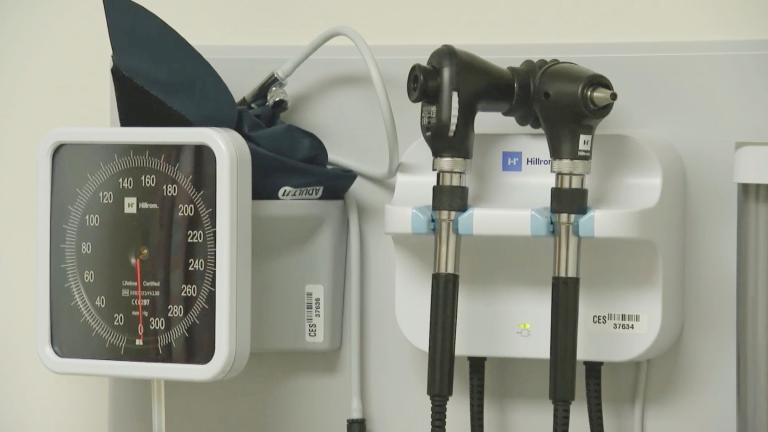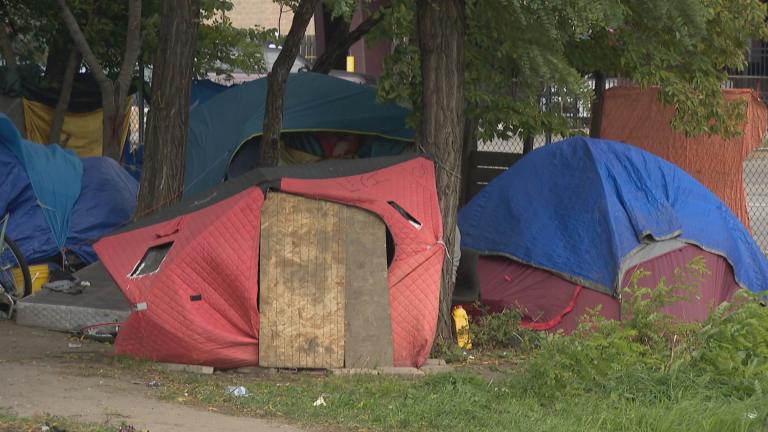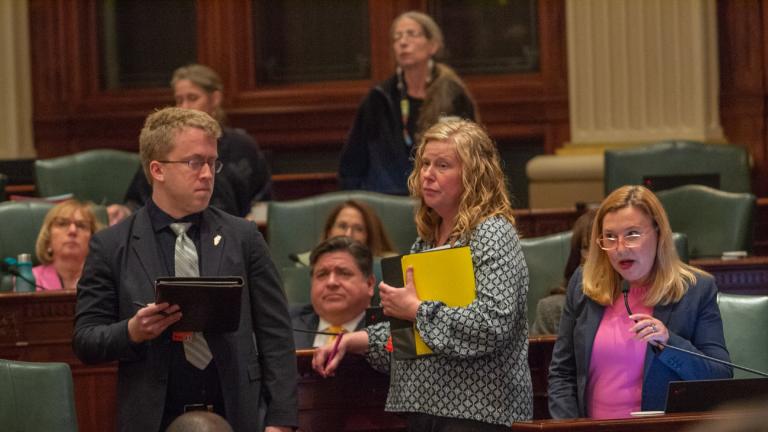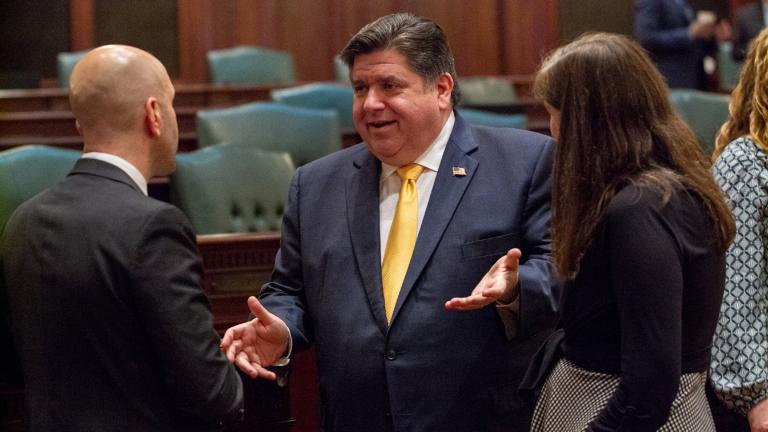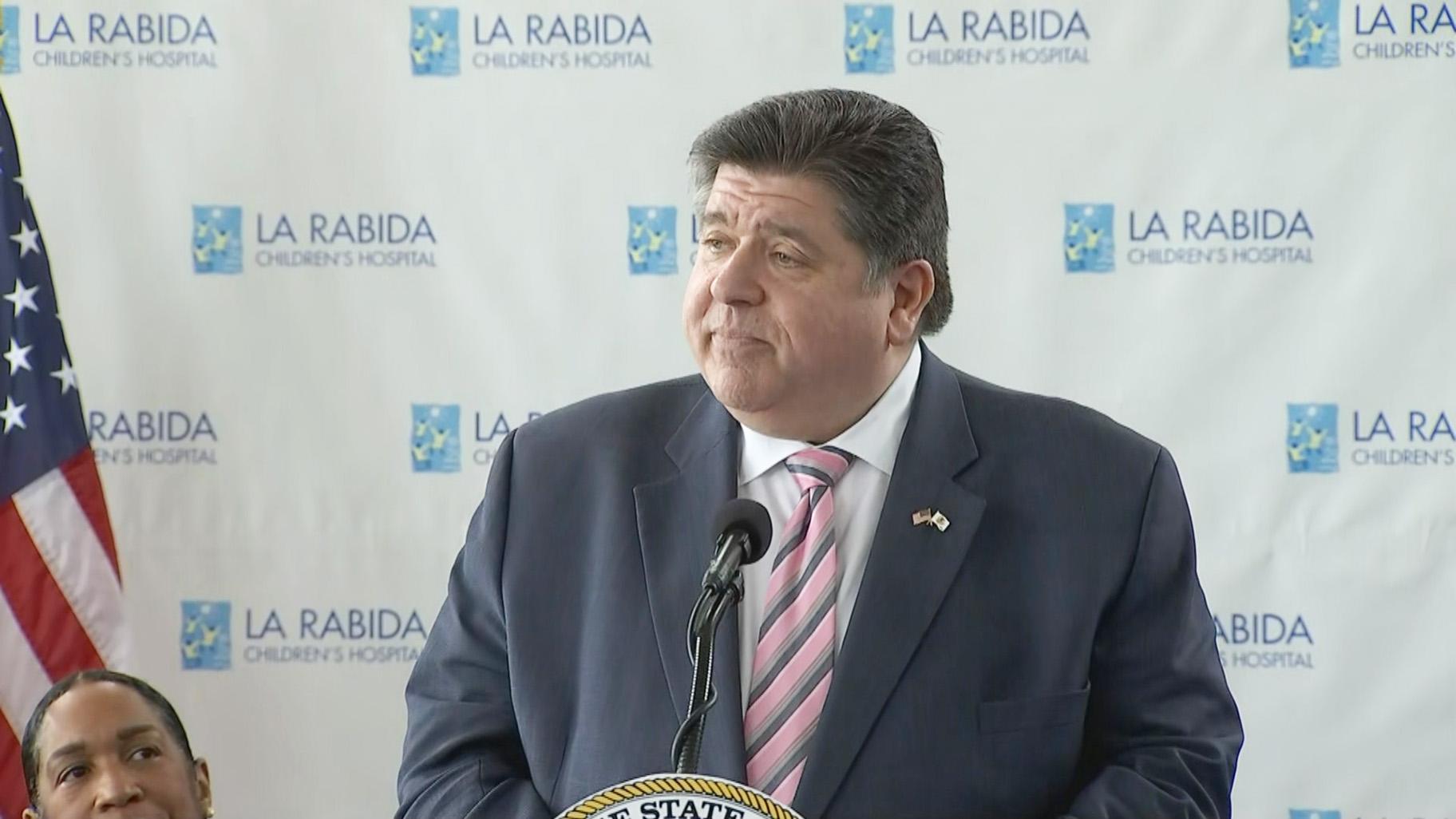 Gov. J.B. Pritzker is pictured during a March 18, 2024, press conference. (WTTW News)
Gov. J.B. Pritzker is pictured during a March 18, 2024, press conference. (WTTW News)
Chicago’s transition to an elected school board is now official, with Gov. J.B. Pritzker on Monday signing a law that will give voters the power to elect almost half of the body’s members this year.
Under the new law, voters will elect 10 members in Novembers while Chicago Mayor Brandon Johnson will appoint 10 members of his choosing, plus the board president. That leaves the board under mayoral control until 2027, when the city would move to a fully-elected school board.
“Today marks the start of an exciting new era in community-led education in which the parents, families and taxpayers of Chicago are empowered to decide what is best for their schools,” said state Senate President Don Harmon. “This move to elected, representative democracy for Chicago Public Schools is an achievement decades in the making and a testament to the power of collective action.”
Pritzker issued no statement alongside notice of the bill signing.
But at unrelated event earlier in the day, the Democratic governor signaled support for a different proposal that would leave the hybrid board somewhat hamstrung by protecting selective enrollment schools – a sign of a new stand-off over the direction of Chicago schools, given that the politically-powerful Chicago Teachers Union said those schools shouldn’t get special treatment.
Under the measure (House Bill 5766) introduced by state Rep. Margaret Croke, a Democrat who lives in Lincoln Park, the Chicago Board of Education could not close any selective enrollment schools until February 2027.
“I think it would be a mistake, before the people get a chance to vote all of the new members of the Board of Education in, and so I’m supporting that bill,” Pritzker said. “I think she’s done a good job with it.”
Illinois House Speaker Emanuel “Chris” Welch is a co-sponsor of the bill.
His office said the bill is consistent with Welch’s long history of supporting selective enrollment schools. Before he was speaker, Welch chaired the Proviso Township Board of Education as it created the Proviso Mathematics and Science Academy.
Croke told WTTW News she crafted the measure because her constituents are concerned about how a majority-appointed board will handle the district’s prized selective enrollment options following the recent passage of a five-year vision that Board President Jianan Shi described as a “transformational plan that shifts away from a model that emphasizes school choice to one that elevates our neighborhood schools to ensure each and every student has access to a high-quality educational experience.”
The release said the board wanted to emphasize “the resolution is not a vote to close selective enrollment, magnet, or charter schools.”
But the resolution stoked fears among some CPS families whose children attend, or want to attend, those schools, and that parents talked to don’t believe CPS’s assurances, Croke said.
“It’s one of the reasons I have constituents staying (in the city) is because they want their kids to go to selective enrollment schools, which are some of the best schools in the entire state,” Croke said.
In a statement Monday, a CPS spokesperson said that whatever the outcome of pending state legislation, the district will follow state law. The statement also stressed that there are no specific plans to take action that would dismantle selective enrollment options.
“The resolution sets the parameters of the District’s next strategic plan, which will aim to prioritize neighborhood schools and students furthest away from opportunity and ensure that all students have access to a world-class public pre-k through 12th-grade education,” the statement reads. “Since the resolution was approved, the Board has made several public statements affirming that Resolution 23-1214-RS3 has no immediate impact on any school. Importantly, there are no plans to close any selective enrollment elementary or high schools.”
But Croke said “I just don’t think people trust them right now.”
“I don’t think we can trust the current school board on what they are saying,” she said. “They haven’t been able to answer straight questions from representatives about the changes that they would like to make to selective enrollment schools, which makes people incredibly uneasy in the Legislature.”
As part of a 2021 law laying the groundwork for an elected school board, the legislature put a moratorium on CPS school closures that lifts in 2025.
Cassie Creswell, director of Illinois Families for Public Schools, called the effort to protect CPS selective enrollment schools with a state law a “very emotional, reactionary bill” that’s a form of “micromanaging” that could be “potentially very damaging”
It’s a “dramatic overreaction” to the December resolution, Creswell said, which she said was misrepresented in the media as a death blow to selective enrollment schools. In her view, the resolution was about a broader plan about how to best allocate the district’s resources, which she said have been “inequitably allocated for many years.”
Creswell said that has to be fixed because “we’re not serving kids in neighborhood schools well enough.”
She has other critiques of the measure as well, including what she says is the lack of a definition on what constitutes selective enrollment, and that the bill ignores existing state law requiring CPS to follow a specific process for facilities planning – a law borne of “arbitrary school actions” and closures of neighborhood schools that has been devastating for affected Chicago communities.
Another main point of Creswell’s criticisms may be quelled by changes Croke said she plans to make to the bill.
As initially drafted, the proposal freezes spending on selective enrollment schools.
Critics say that means if CPS’ overall budget is reduced, neighborhood schools would have to bear the full brunt of cuts.
“Tying the board’s hands in terms of being able to make any budgetary decisions, and cuts that only will now fall on a set of schools, which happen to be historically the most under-resourced, it doesn’t make any sense and would be harmful,” Creswell said. “The idea that if the district is faced with a revenue shortfall, you will not be able to make any budgetary changes is really asinine.”
Croke said she’s updating the proposal so that cuts, or increases, would be spread across all schools.
“Everyone rises and falls together,” she said.
Croke said neither CPS nor the mayor’s office have reached out to her about the legislation. She said she has had conversations with the Chicago Teachers Union.
The CTU on Monday issued an “action alert” to supporters asking that they pressure Croke to amend her legislation, so that it would put a moratorium on all “school closing and budget cuts for all CPS schools, until a fully elected school board is in place in 2027.”
CTU fought against efforts earlier this month that would immediately move to an all-elected board, and worked for lawmakers to maintain the ability of Johnson — a former CTU organizer —to appoint the majority of the board.
“We appreciate Gov. Pritzker’s support for selective enrollment schools and his signing of the Elected School Board bill earlier today. But we also need the Governor to commit to protecting and supporting all of Chicago’s public schools, in all 77 neighborhoods, whether they are north or south of Roosevelt Road or east or west of Western Avenue,” the email from CTU said. “Say NO to school closings or program cuts at ANY CPS school.”
With the expiration of federal dollars that have been propping up CPS and other schools since the COVID pandemic, Chicago’s school system is preparing for major drop in funding that could leave it hundreds of millions in the red.
Croke, who earlier this month voted for the hybrid elected school board, said that she expects to advance her legislation this spring.
She also said she expects school board candidates’ stances on selective enrollment will be a major topic as residents run for the 10 seats.
Contact Amanda Vinicky: @AmandaVinicky | [email protected]

